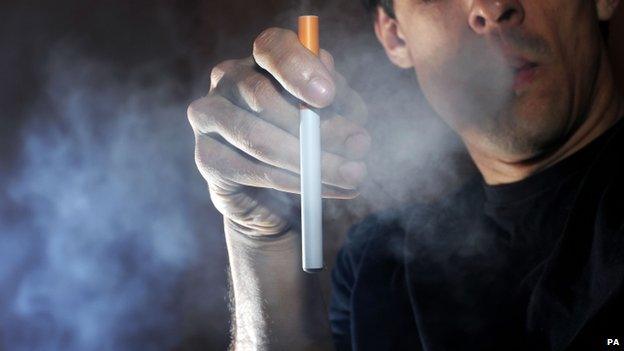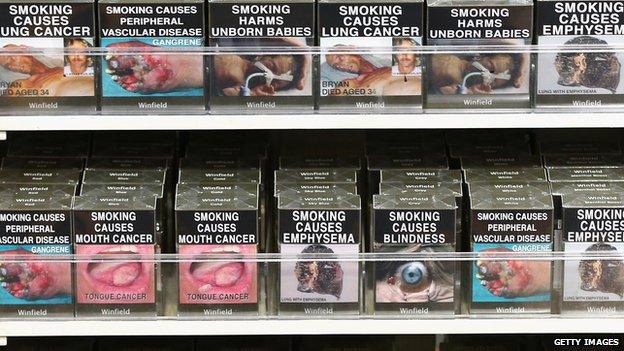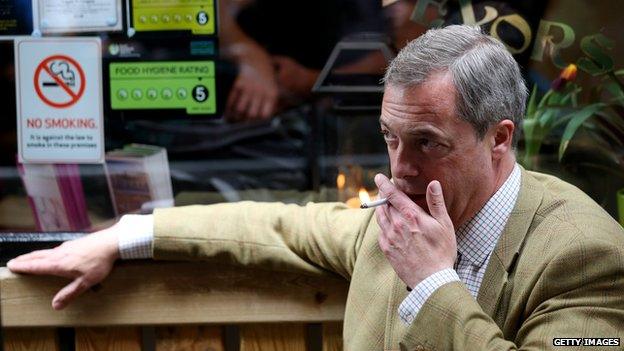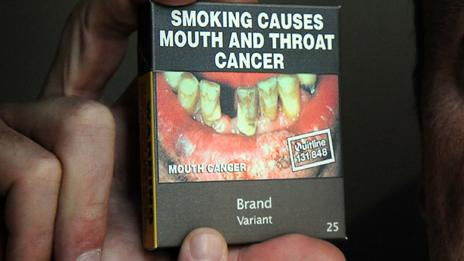Can the tobacco industry shed its 'toxic brand'?
- Published

Many of Britain's electronic cigarette brands are owned by tobacco companies
The UK tobacco industry has made billions of pounds and killed millions of people over the years but it is increasingly seeking to diversify by switching to e-cigarettes, which although addictive are less harmful.
Each year, more than six million customers of the tobacco industry around the world die from smoking. In the UK alone, 100,000 people lose their lives annually from the world's biggest cause of preventable death.
The British tobacco industry is now developing a range of much safer products based on nicotine and not the tobacco that produces deadly carcinogens when burned.
British American Tobacco (BAT) has already put its first electronic or e-cigarette on the market, and the company is spending £160m every year on improving new, safer products.
"The future is about tobacco harm reduction. It's about providing a range of alternative nicotine products for consumers," says Kingsley Wheaton, BAT's director of corporate and regulatory affairs.
"We are indeed the problem. That is no reason for us not to be part of the solution," he adds.
But he accepts that for decades to come the lion's share of BAT's profits will come from selling and marketing regular cigarettes.
Though the habit is slowly declining, about one in five British adults still smoke. Smoking among 20 to 34-year-olds has actually increased in the past few years.
And though the tobacco industry insists it does not target children, every year 200,000 of those aged 11-15 start smoking.
I've spent nearly 40 years investigating how in the past the industry has dissembled and lied, refusing to accept the medical evidence.
That has changed and the industry now accepts that smoking causes a range of serious, terminal diseases, but only after decades of unrelenting pressure from governments and concerned health groups.
Darling of the City
As a result, its ability to market cigarettes has been severely restricted.
And for an industry under constant attack, it is in remarkable health, with eye-watering profits of more than £30bn a year.
Tobacco is the fatal addiction. It still remains the darling of the City, with nearly everyone sharing in its profitability through pension funds - and governments are addicted too.
Tobacco taxes bring in nearly twice the direct cost to the NHS of treating smoking-related diseases.
BAT was the only tobacco company that opened its doors to us.
For decades cancer was the forbidden word in BAT's research labs in Southampton. The killer disease went by the secret codename "zephyr".
BAT's current scientific director, Dr David O'Reilly, speaks a different language. Hard truth has replaced deception and lies.
"Cigarette smoking is a cause of real and serious diseases," he says. "Cancer, particularly cancer of the lung, heart disease, stroke and heart attack and respiratory disease such as bronchitis and emphysema."

Smoking among 20 to 34-year-olds has increased in the past few years
"For a lifetime smoker, about half of them can expect to die prematurely as a result of their cigarette smoking," he adds.
But the industry still defends its right to sell and market a product that kills.
"It's a well-governed international business. It's a legal business," says Mr Wheaton, "we have a legitimate right to operate.
"At the same time that we may have increased our share price and our profits, governments have also increased their excise take substantially. In fact we pay something like £30bn worth of excise to exchequers all over the world," he says.
Swingeing tax increases
The industry also now hopes it may be able to remove the stigma that has long been attached to its business, viewed over decades by its critics as a toxic brand.
Among the industry's multiple setbacks over the years are swingeing tax increases on cigarettes in the West.
Prof John Britton, of the UK Centre for Tobacco Control Studies, one of the country's leading experts on smoking prevention, argues that the price of a pack of cigarettes should rise to £20 to reduce the impact on public health.
"Talking to smokers, many will say if you made it £20 a pack I'd stop smoking," he says.
The industry now faces its biggest battle in decades - against plain packaging.
Australia, where glossy packages were consigned to the dustbin of history in 2012, has the most stringent anti-smoking legislation in the world.
But that is only the result of a long and fierce battle with the tobacco industry.

British tobacco companies are fighting attempts to introduce Australian-style packaging
It tried to kill the legislation, anonymously funding an advertising campaign claiming plain packaging did not work.
In England and Wales, the battle over plain packaging has been even more politically contentious, and is still far from over.
Legal heavyweights
Now the government is "minded" to legislate but only after yet more consultation. This follows a report from leading paediatrician, Prof Sir Cyril Chantler, who found that plain packaging was "very likely to have a positive impact" on public health and stop children from starting to smoke.
Ireland, which is committed to introduce plain packaging this year, is next in line for a visit from the industry's legal heavyweights. Health Minister James Reilly has no illusions.
"I can tell you I'm 100% convinced they're going to take legal action but we anticipated that so we have retained the best of people way back before this fight began," he says.

UKIP leader Nigel Farage has spoken out against the introduction of plain packaging
Once more, tobacco companies are preparing to fight a last-ditch battle, arguing that plain packaging violates their intellectual property.
"The government's simply taking something which is not theirs and taking that property as if it were their own," says Mr Wheaton.
Advertising has always been the engine that drives cigarette sales - associating the product with anything but their lethal reality.
'Decent people'
On this crucial issue, which is what makes smoking seem so seductive, the industry still uses the same old argument that it is simply designed to persuade smokers to switch brands.
Prof Chantler is not convinced: "I can't see how you can quarantine 15 to 18-year-olds or younger children.
"We have a duty of care to our young people and our children and we should do everything we can to encourage them not to do something they will regret in later life.
"I wish the tobacco industry would just accept it. They're decent people, so why don't they do their very best to help us all reduce the risk of young people starting to smoke?"
Burning Desire: The Seduction of Smoking is on BBC Two on 29 May at 21:30 BST.
- Published29 May 2014

- Published3 April 2014
- Published1 December 2012
